World
Thailand Parliament Elects New Prime Minister – Anutin Wins
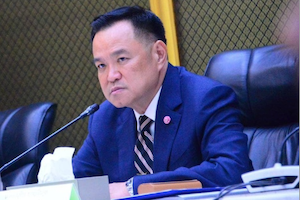
On September 5, Thailand’s Parliament voted to elect the country’s 32nd Prime Minister. Anutin Charnvirakul, leader of the Bhumjaithai Party, secured victory with 311 votes, surpassing the majority threshold and defeating his rival, Thai Party candidate Chaikasem, who received 152 votes.
Anutin, 58, comes from a prominent political and business family of Chinese-Thai heritage, with parents originally from Guangdong, China. He studied industrial engineering in the United States and entered politics at the age of 30. After the dissolution of the Thai Rak Thai Party in 2007, he was banned from political activities for five years. He returned to politics in 2012 to lead the Bhumjaithai Party and has since been a part of several coalition governments. Known for his political adaptability, he has earned the nickname "political chameleon." He has previously served as Deputy Prime Minister, Minister of the Interior, and Minister of Public Health. One of his most notable achievements was delivering on his 2022 campaign promise to legalize cannabis.
Beyond his political and business background, Anutin is known for his unique personal traits. Nicknamed "Noo" (meaning "mouse" in Thai), he is fond of street food, enjoys playing the saxophone, and is an avid collector of Buddhist amulets. He is also a licensed pilot and once earned public praise for personally flying a small aircraft to transport organs for emergency medical procedures.
As Prime Minister, Anutin faces formidable challenges, including a sluggish economy, tightening credit, tensions along the Thai-Cambodian border, and ongoing political unrest. Whether he can stabilize the political landscape and fulfill his promises within what may be a short term in office remains a focal point of public attention.
- 24 reads
The Trump administration's freeze on funding for Harvard University ruled unconstitutional by judge.
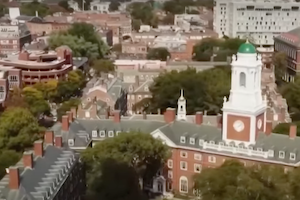
On the 3rd, a U.S. federal court ruled that the Trump administration's decision to cut federal funding to Harvard University was unconstitutional, stating that the measure violated the First Amendment's protection of free speech. The ruling helps prevent major harm to academic research and academic freedom that could result from financial sanctions. However, the White House expressed dissatisfaction with the decision and announced plans to appeal.
Harvard University, one of the top institutions in the United States, has seen repeated protests on campus in support of Gaza and against Israel since the outbreak of the Israel-Gaza war. Trump criticized Harvard for failing to adequately protect Jewish and Israeli students and for fostering antisemitism. He demanded changes to the university’s governance and admissions policies. After Harvard refused, the Trump administration ordered a freeze on the university’s large-scale federal funding. In April, Harvard filed a lawsuit seeking to unfreeze more than \$2 billion (approximately NT\$61.5 billion) in federal aid. On the 3rd, U.S. District Judge Allison Burroughs in Boston ruled that, even if combating antisemitism is a legitimate goal, the administration’s pressure on Harvard to comply with government demands was unconstitutional and violated the First Amendment's guarantee of free speech.
White House spokesperson Liz Huston immediately issued a statement the same day, asserting that Harvard had tolerated discrimination and failed to adequately protect students from harassment, and therefore was not entitled to receive taxpayer funding. The U.S. government will file an appeal.
- Read more
- 21 reads
First in the U.S.: Tennessee Requires Gun Safety Classes for Children Starting at Age 5

Public health officials in the United States have identified firearms as the leading cause of death among children and adolescents. Tennessee has become the first state in the nation to pass legislation mandating gun safety education for children, with public schools beginning implementation this year. Children as young as five will now receive gun safety instruction.
According to guidelines released by the Tennessee Department of Education, students aged 5 to 8 should be able to distinguish between toy guns and real firearms. The curriculum is designed to teach children to "demonstrate a responsible attitude toward firearms" and to recognize various parts of a gun. This course will be a required subject for all students from elementary through high school graduation, to be taken annually.
The state’s guidelines do not specify how the course should be taught or how much time should be allocated to it, but they clearly prohibit the use of live ammunition, actual shooting, or real firearms during instruction. Teachers must also remain neutral on political issues. Schools are allowed to invite police officers or public health experts to assist with the lessons.
- Read more
- 25 reads
Houthis Retaliate Against Israeli Strike That Killed Prime Minister by Raiding UN Compounds in Yemen

On August 31, Yemen’s Houthi armed group launched raids on several United Nations facilities in the capital city, Sana’a, and forcibly detained at least 11 UN staff members. The violent incident occurred just three days after an Israeli airstrike killed key figures in the Houthi-led government, including the Prime Minister and several ministers, drawing intense international concern.
According to foreign media reports, UN Secretary-General António Guterres issued a strong statement condemning the Houthi forces for forcibly entering the offices of UN agencies such as the World Food Programme. The group reportedly seized UN property and attempted to gain access to other UN offices in Sana’a. Guterres called for the immediate release of all detained personnel and urged respect for international humanitarian law.
UN Special Envoy to Yemen, Hans Grundberg, stated that the kidnapped UN personnel came from various agencies, including UNICEF, the United Nations Development Programme (UNDP), and the United Nations High Commissioner for Refugees (UNHCR), all of which have offices in Sana’a and Hodeidah.
Grundberg noted that this was not the first time the Houthis had detained UN staff. Previously, they had held 23 UN employees, some of whom have been imprisoned since 2021. Tragically, one of the detainees reportedly died in custody earlier this year.
The raid appears to have been triggered by an Israeli airstrike on Sana’a on August 28. The military action targeted senior leadership of the Iranian-aligned Houthi movement and resulted in the deaths of Houthi Prime Minister Ahmed al-Rahawi and several cabinet ministers. In response, the Houthis issued threats of retaliation and warned foreign businesses to evacuate Israel immediately.
Israel stated that the airstrike was primarily aimed at top Houthi figures such as the Chief of Staff and the Minister of Defense, though it has not confirmed whether the Defense Minister was among the casualties.
- Read more
- 29 reads
Afghanistan’s Eastern Region Hit by Series of Late-Night Shallow Quakes, Strongest at Magnitude 6, Leaving Multiple Casualties

A powerful magnitude-6 earthquake struck eastern Afghanistan late at night on August 31 at 11:47 p.m., with the epicenter located about 27 kilometers east-northeast of Jalalabad in Nangarhar Province. The quake had a shallow depth of only 8 kilometers. The disaster caused widespread building collapses, with the worst devastation reported in the remote Kunar Province. So far, more than 800 people have been confirmed dead and over 2,800 injured, making it Afghanistan’s deadliest earthquake since 2022.
Taliban government spokesman Zabihullah Mujahid stated at a press conference in Kabul that Kunar Province had suffered the heaviest losses, with around 800 deaths and 2,500 injuries reported. In Nangarhar Province, authorities confirmed 12 deaths and 255 injuries. Military rescue teams were dispatched to the disaster zone, completing 40 helicopter sorties to transport 420 injured victims. Rescue efforts, however, have been hampered by treacherous terrain, landslides, collapsed roads, and disrupted communications. Several villages were almost entirely destroyed, forcing survivors to sleep outdoors in freezing temperatures with limited supplies.
Afghanistan lies on the boundary between the Eurasian and Indian tectonic plates, making it highly prone to earthquakes, especially in the Hindu Kush Mountains. In June 2022, a magnitude-6.1 earthquake killed at least 1,000 people, while a series of quakes in the country’s western region last year claimed more than 1,000 lives in total, highlighting Afghanistan’s vulnerability to natural disasters. The latest earthquake has deepened the ongoing humanitarian crisis, with the United Nations calling on the international community to provide urgent assistance, stressing the critical need for tents, food, and medical resources. Local markets have been completely shut down, and widespread power outages are further complicating rescue and recovery operations. Villagers continue searching through the rubble in hopes of finding survivors.
- Read more
- 45 reads
Putin Arrives in China for Sept. 3 Military Parade, Expected to Appear with Xi Jinping and Kim Jong-un
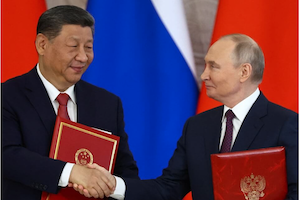
Russian President Vladimir Putin arrived in Tianjin, China, on August 31 aboard a special flight to begin a four-day visit. In addition to attending the Shanghai Cooperation Organization (SCO) summit, Putin will travel to Beijing to participate in the military parade on September 3 commemorating the 80th anniversary of the victory in the War of Resistance against Japan. He is expected to appear alongside Chinese President Xi Jinping and North Korean leader Kim Jong-un. This move not only symbolizes the strategic alignment of China, Russia, and North Korea but also underscores Putin’s intent to deepen pragmatic cooperation with China and expand multilateral diplomatic engagement.
Putin stated that during this visit he will hold in-depth talks with Xi Jinping covering political security, economic and trade cooperation, and cultural exchanges. He emphasized that China-Russia trade relations have reached a historic high, with bilateral trade volume increasing by about USD 100 billion since 2021. China has become Russia’s largest trading partner, and bilateral settlements have almost entirely shifted to local currencies, with the share of the U.S. dollar and euro dropping to negligible levels. In the energy sector, Russia remains one of China’s top suppliers of oil and natural gas. Since the “Power of Siberia” pipeline began operations in 2019, cumulative gas deliveries have exceeded 100 billion cubic meters, and the two sides plan to launch the “Far Eastern Route” pipeline in 2027 to further expand cooperation.
According to Li Yonghui, director of the Institute of Russian, Eastern European, and Central Asian Studies at the Chinese Academy of Social Sciences, Putin’s “unprecedented” visit aims to elevate China-Russia relations in scope, depth, and resilience, while highlighting their shared positions on multilateralism and global governance. The two countries are expected to continue strengthening coordination within the UN, BRICS, and other multilateral frameworks, jointly opposing unilateralism and bloc confrontation, and working to safeguard the international order and global strategic stability.
In addition, Putin will use the SCO summit and the September 3 parade as opportunities to engage in high-level talks with other world leaders, emphasizing that Russia is not diplomatically isolated despite the ongoing conflict in Ukraine. He also hopes to advance multilateral cooperation in counterterrorism, information security, and drug control through these platforms.
- 48 reads
Trump’s Tariff Policy Hit Again as Federal Appeals Court Rules It Illegal
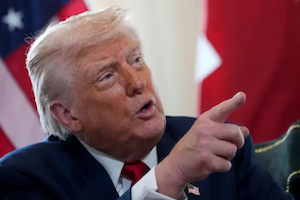
On August 30, the U.S. Federal Court of Appeals, in a 7–4 ruling, declared several broad tariff orders issued by President Trump under the 1977 International Emergency Economic Powers Act (IEEPA) unlawful and invalid. The court held that the IEEPA does not explicitly grant the president authority to impose tariffs, and that such measures bypassed the legislative process and lacked clear congressional authorization. While the ruling upheld the lower court’s decision, the appellate court allowed the tariff measures to remain in effect until October 14, pending a possible appeal to the Supreme Court.
The court emphasized that although the IEEPA grants the president authority to regulate international transactions during specific emergencies, it does not extend to taxation or tariff powers, which traditionally require congressional approval. Judges noted that Trump’s “sweeping and boundless” measures clearly exceeded the scope of the law. However, tariffs imposed under other statutes—such as the steel and aluminum tariffs established under Section 232 of the 1962 Trade Expansion Act—remain valid.
Trump blasted the ruling on social media as a “national disaster,” accusing the judiciary of deep bias. He vowed to fight all the way to the Supreme Court, writing that “all tariffs remain legal, and only the Supreme Court can return these weapons to us.” He warned that losing these tariffs would deal a major blow to American workers and businesses. The White House and the Department of Justice confirmed they would immediately appeal to the Supreme Court and may consider relying on the 1974 Trade Act as a legal basis for future tariffs. Meanwhile, Congress has already introduced the 2025 Trade Review Act, a bill that would require the president to notify Congress of any new tariffs and obtain legislative approval within 60 days, or else the measures would lapse.
Since tariff revenues are an important source of federal income—totaling $28 billion in July 2025 alone—economists warn that repealing these measures could create a revenue gap, forcing the government to issue more debt and potentially altering Federal Reserve monetary policy. Others argue that the ruling restores proper constitutional balance, reduces the risk of executive overreach, and realigns trade policy with institutional norms. Businesses, however, face mounting uncertainty that could ripple across the broader economy.
Analysts note that the ruling not only strikes at the core of Trump’s tariff-driven trade war but also reignites a constitutional debate over the balance of power between Congress and the executive branch. If the Supreme Court ultimately upholds the decision, the U.S. government could face profound legal and economic challenges. At the same time, congressional action will be closely watched. With Republicans holding the majority, lawmakers may pursue legislation to reestablish greater structure and transparency in trade policymaking.
Overall, this legal and political battle will determine not only whether Trump’s economic strategy can remain in effect, but also how the future boundaries of U.S. executive power and institutional design will be defined.
- 30 reads
Modi Visits Japan, Finalizes Japan-India Investment Plan

Indian Prime Minister Narendra Modi embarked on a two-day visit to Japan on the 29th, marking his first meeting and bilateral talks with Japanese Prime Minister Shigeru Ishiba. The two leaders exchanged views on comprehensive future cooperation and regional affairs. This visit also marks Modi’s return to Japan following the G7 summit held in Hiroshima in May 2023.
On the first day of his visit, Modi attended the Japan-India Economic Forum and later held a 1.5-hour meeting with Prime Minister Ishiba at the Prime Minister’s Office. During the meeting, the two sides agreed to revise the “Japan-India Joint Declaration on Security Cooperation” originally signed in 2008, adding more detailed content on defense collaboration to strengthen bilateral defense ties. They also reached a consensus under the “Economic Security Cooperation Initiative” to promote technological cooperation in various fields such as semiconductors, artificial intelligence (AI), critical minerals, and the tech industry.
Japan plans to invest approximately 10 trillion yen in India’s private sector over the next decade. The two countries will also promote bilateral exchanges exceeding 500,000 people within five years, including increased recruitment of Indian talent. This initiative aims to address Japan’s projected shortage of 570,000 caregivers by 2040, helping to support the needs of its aging society and fostering a mutually beneficial partnership.
One of the highlights of the talks was the agreement to jointly build India’s first high-speed railway. The line will connect Mumbai with the industrial city of Ahmedabad, stretching around 500 kilometers. Initially agreed upon in 2015 by former Japanese Prime Minister Shinzo Abe and Modi, the project was originally scheduled to begin operations in 2023 but was delayed to 2029 due to land acquisition issues and the COVID-19 pandemic. The project, with an estimated cost of 1.8 trillion yen, will involve Japanese experts providing support in construction and workforce training.
On the 30th, Modi is scheduled to ride the Shinkansen for an on-site inspection of the test train and visit a semiconductor manufacturing plant to gain a deeper understanding of the relevant technologies.
After concluding his visit to Japan on the 30th, Modi will travel to China to attend the Shanghai Cooperation Organization (SCO) summit, where he is expected to meet with Chinese President Xi Jinping and Russian President Vladimir Putin. Modi’s East Asia tour is widely seen as a strategic effort to strengthen multilateral alliances.
- Read more
- 25 reads
South Korea Passes Legislation Supporting School Cell Phone Ban

On August 27, the South Korean National Assembly passed a bill banning students from using mobile phones during class. The law is expected to take effect next semester, beginning in March of next year. Two political parties cooperated to pass the bill, aiming to prevent smartphone addiction among children and adolescents and minimize its impact on academic performance. The bill passed with 163 votes in favor and 115 against.
Previously, countries like Finland and France only imposed phone restrictions in lower-grade schools, while Italy, the Netherlands, and China have implemented broader bans across all schools. Many schools in South Korea had already enacted their own rules, but this new legislation now makes South Korea one of the few countries to formally legislate a ban on student phone use.
Jo Jung-hoon, a lawmaker from the People Power Party who proposed the bill, stated that abundant evidence shows smartphone addiction is extremely harmful to students' brain development and emotional growth. According to statistics from South Korea's Ministry of Education, 37% of middle and high school students believe that social media negatively affects their daily lives, and 22% report feeling anxious when they cannot access it. While the law only prohibits phone use during class, it also gives teachers the authority to restrict phone use throughout the school grounds. Additionally, schools will be required to educate students on the proper use of smart devices.
Despite the new law, opinions among educational groups are divided. The conservative Korean Federation of Teachers' Associations supports the bill, noting that 70% of teachers report being distracted by students using phones during class. They also stated that when students are restricted from using phones, they often react uncontrollably, sometimes verbally lashing out or even becoming physically aggressive.
However, the Korean Teachers and Education Workers Union argues that some of its members believe the law infringes on students' rights to use smartphones.
Due to intense competition surrounding South Korea’s university entrance exam (Suneung), one student told the BBC that he hardly has time to use his phone anyway, as private tutoring and homework often keep him up past midnight. Another student noted that while phone use is banned during class, students still use their phones before and after school, so the restrictions have limited effect. They emphasized that addiction is still possible and criticized the law for merely confiscating phones during class rather than truly teaching students “what to do when they don’t have their phones.”
- Read more
- 117 reads
Israel Strikes Gaza Hospital Again, Causing Casualties Among Journalists and Medical Staff, Drawing International Condemnation
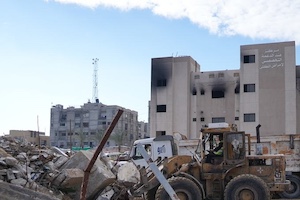
On the 25th, Israel launched another attack on the Gaza Strip, targeting Nasser Hospital in the southern city of Khan Younis. The strike resulted in at least 20 deaths, sparking international outrage. Among the victims were five journalists from Reuters, Associated Press, and Al Jazeera, as well as several medical workers. U.S. President Donald Trump, along with the United Nations, Germany, and the United Kingdom, continued to call for the protection of civilians and media personnel.
Israeli Defense Forces (IDF) spokesperson Effie Defrin admitted that the military's actions caused civilian and journalist casualties. Israeli Prime Minister Benjamin Netanyahu also publicly expressed regret, stating, “Israel deeply regrets this.” However, Israel placed blame on Hamas, accusing the group of using hospitals to monitor Israeli military movements. According to a report by *The Times of Israel*, the IDF initially planned to target rooftop surveillance cameras with drones, but later fired two tank shells, which led to casualties among first responders and journalists who had arrived after the initial strike.
United Nations Secretary-General António Guterres called for the protection of civilians and medical personnel and demanded an impartial investigation. In a White House interview, Trump also expressed displeasure, saying, “We don’t want to see this kind of situation.”
Iran not only accused Israel of committing war crimes but also explicitly called the United States an accomplice.
Italian Prime Minister Giorgia Meloni stated on the 27th that while Italy supports Israel’s right to security and self-defense, the scale of Israel’s attack has exceeded the principle of proportionality. She emphasized that too many innocent lives have been lost and that attacks on journalists are completely unacceptable.
- Read more
- 31 reads
Human Rights
Fostering a More Humane World: The 28th Eurasian Economic Summi

Conscience, Hope, and Action: Keys to Global Peace and Sustainability

Ringing FOWPAL’s Peace Bell for the World:Nobel Peace Prize Laureates’ Visions and Actions

Protecting the World’s Cultural Diversity for a Sustainable Future

Puppet Show I International Friendship Day 2020

